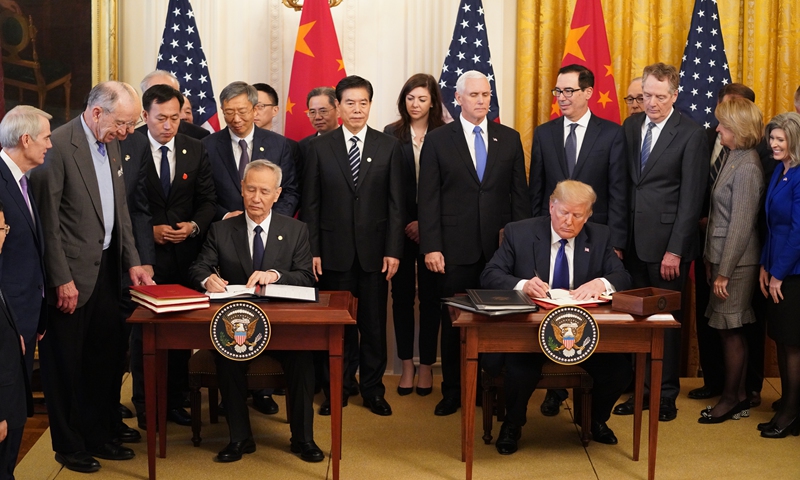US politicians should 'watch their language' about trade deal with China: expert
Anti-China politicians shock market with ‘own goal’

Chinese Vice Premiere Liu He and US President Donald Trump signed the phase one trade deal at the White House. Photo: Xinhua
Some US politicians need to learn to restrain themselves and watch their language in public when talking about the China-US trade deal, observers said, warning that if the Trump administration continuously talks down the deal while China implements it, China will not be responsible should the deal be scrapped in the end.
The comment comes after US President Donald Trump said the US-China trade deal is "fully intact," just hours after White House trade advisor Peter Navarro told Fox News that it was "over," though he clarified later. The twists and turns have not only shocked the world, but also have stoked volatility in stock and currency markets already frazzled by the pandemic.
Senior US trade advisors like Navarro have to learn how to "behave" and accurately express themselves in front of media and the public, as every word and action from people like him will have a major impact on the world market, or ties with other countries, Gao Lingyun, an expert at the Chinese Academy of Social Sciences in Beijing, who closely follows the China-US trade conflict, told the Global Times on Tuesday.
The trade deal is progressing well, Gao said, adding that even if the two wanted to end the deal, there would be a mechanism to go through, rather than just "telling the media."
"The swift clarification also shows Trump administration's nervousness on the trade deal, and internal chaos, as the China card is an important 'political tool' in the election season," Mei Xinyu, an expert close to China's commerce ministry, told the Global Times on Monday.
If the Trump administration continuously talks down on the hard-won trade deal while China is firmly implementing it, the US should take responsibility should the deal be scrapped in the end, Gao said.
In testimony before the US Congress last week, Robert Lighthizer, the US trade representative and the deal's primary architect, said that he was in frequent contact with Chinese officials and that they were working hard to live up to their agreements. "Every indication is that despite COVID-19, they are going to do what they say," Lighthizer said.
In another sign the trade deal is being carried out, China's state-owned enterprises bought at least three cargoes of US soybeans in early June, Reuters reported. The purchases, totaling at least 180,000 tons of oil seed, were earmarked for shipment in October or November.
Relations between China and the US have been strained amid the coronavirus pandemic. Trump and his administration, instead of cleaning up their own mess over their mishandling of the pandemic, have been wasting energy in blaming China to divert domestic attention.
"Nevertheless, both China and the US recognize the importance of the hard-won phase one trade deal, which is steadily progressing," Song Guoyou, a deputy director of the Center for American Studies at Fudan University, told the Global Times on Tuesday.
Some in the US want to deny or scrap the deal over their political intentions, although they do not represent the mainstream stance, Song said.
"But if the US faces problems in supplying relevant products due to the pandemic, China will also fully understand, and the two could also negotiate and step up purchases later in the year," Gao said.
China on Sunday suspended imports from Tyson Foods, one of the largest meat producers in the US on Sunday, over cluster cases of COVID-19.
"If food from the US is contaminated, we should also maintain strict checking standards," said Song, adding that the technology operations should be treated separately to carry out the phase one trade agreement.
Newspaper headline: US politics muddles trade deal